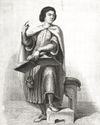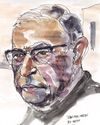
One of the most influential accounts of time in the West is the one produced by Immanuel Kant (17241804). It is my intention here to explore Kant's concept of time, especially the way it is bound up with language. This does not mean that I will reduce the problem of time to a mere matter of language, but I do want to demonstrate that language plays a crucial role in respect to time. To do this I will look at Kant's 1781 blockbuster The Critique of Pure Reason and in particular at the section entitled 'The Transcendental Aesthetic'. Although Kant doesn't spend many words on time, reducing the argument to a footnote at the end of the chapter, the argument is very close to the one he employs with regard to space. But even if one argues that time and space are asymmetrical with respect to the senses - time is part of the 'inner sense', and space is an aspect of the 'outer sense' - time alone is not sufficient to render our experience ordered and comprehensible.
I will argue that the concepts of past, present, and future are not essential to the nature of time as Kant sees it. The idea is that the distinction between future and past - integral to our sense of the flow of time - is inextricably conceptual, and as such does not belong to the sensory elements of our experience, but is thereby inextricably bound to language.
All this needs a little explanation.
The Language of Experience
This story is from the August/September 2023 edition of Philosophy Now.
Start your 7-day Magzter GOLD free trial to access thousands of curated premium stories, and 8,500+ magazines and newspapers.
Already a subscriber ? Sign In
This story is from the August/September 2023 edition of Philosophy Now.
Start your 7-day Magzter GOLD free trial to access thousands of curated premium stories, and 8,500+ magazines and newspapers.
Already a subscriber? Sign In

The Two Dennises
Hannah Mortimer observes a close encounter of the same kind.

Heraclitus (c.500 BC)
Harry Keith lets flow a stream of ideas about permanence and change.

Does the Cosmos Have a Purpose?
Raymond Tallis argues intently against universal intention.

Is Driving Fossil-Fuelled Cars Immoral?
Rufus Duits asks when we can justify driving our carbon contributors.

Abelard & Carneades Yes & No
Frank Breslin says 'yes and no' to presenting both sides of an argument.

Frankl & Sartre in Search of Meaning
Georgia Arkell compares logotherapy and atheistic existentialism.

Luce Irigaray
Luce Irigaray, now ninety-two years old, was, among many other things, one of the most impactful feminists of the 1970s liberation movements - before she was marginalised, then ostracised, from the francophone intellectual sphere.

Significance
Ruben David Azevedo tells us why, in a limitless universe, we’re not insignificant.

The Present Is Not All There Is To Happiness
Rob Glacier says don’t just live in the now.

Philosophers Exploring The Good Life
Jim Mepham quests with philosophers to discover what makes a life good.